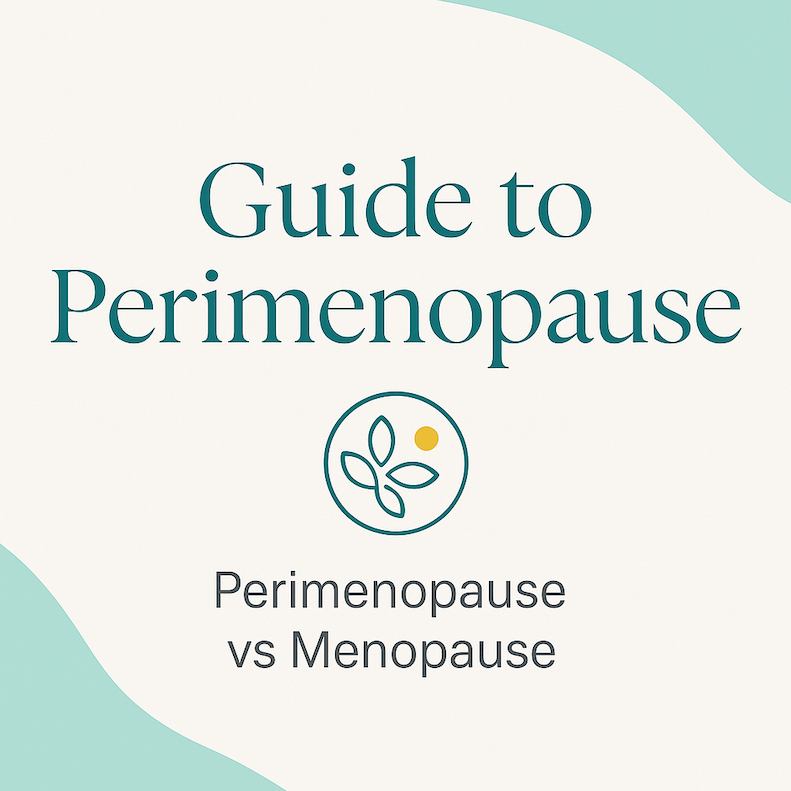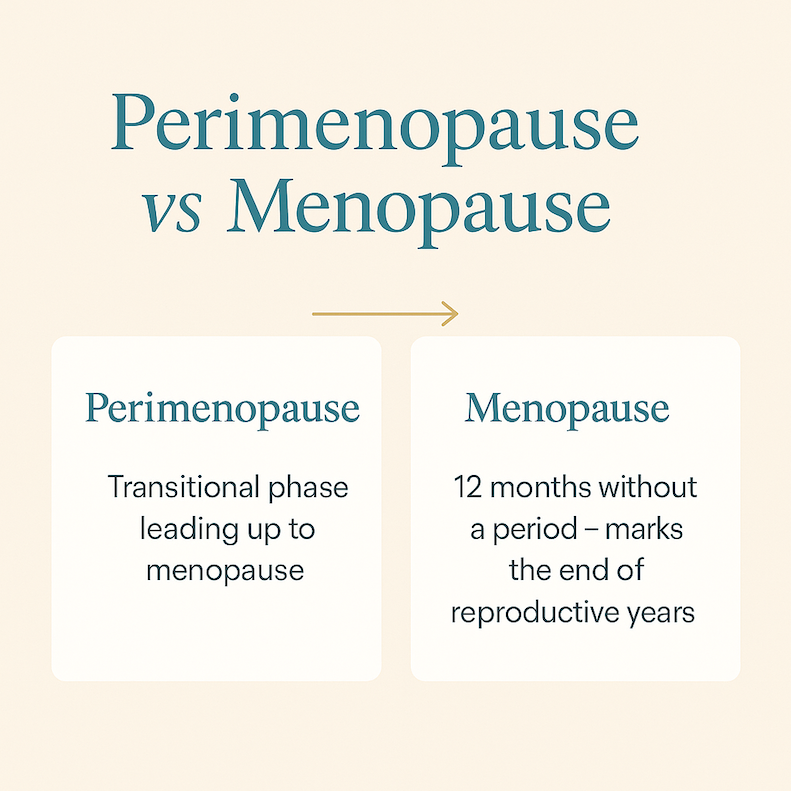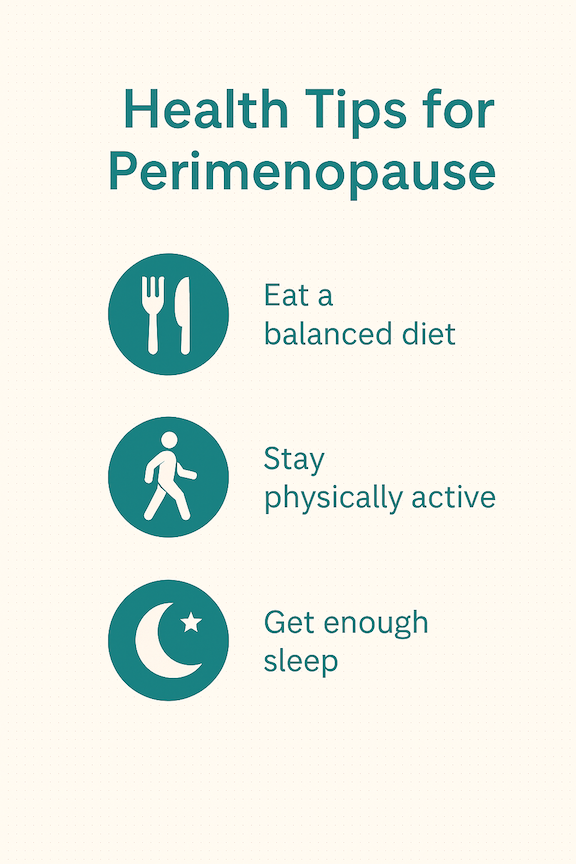
Perimenopause vs Menopause: What's Really Going On With Your Body?
Feeling off but not sure why?
From brain fog and mood swings to disrupted sleep, the years leading up to menopause can be confusing — and often dismissed as “just getting older.” This guide breaks down what’s actually happening in your body, and what you can do to feel better.
Every woman will experience the transition into menopause at some point in her life — but few are truly prepared for it. The years leading up to menopause can bring unexpected physical and emotional changes. From brain fog and hot flashes to sleep disruptions and mood swings, this period of hormonal transition is called perimenopause — and it’s often misunderstood or overlooked.

In this guide, we’ll explore the difference between perimenopause and menopause, how to recognize the signs, and what you can do to manage your health during this pivotal time. Whether you're in your late 40s or early 50s, or just starting to experience symptoms, this article is designed to help you stay informed, proactive, and supported.
If you’re in the Portland or Tigard, Oregon area, you’ll be glad to know that expert help is available locally from Dr. Colleen Amann-Shah, a naturopathic physician and primary care provider who specializes in women’s health and hormonal care.
Perimenopause and Menopause: What’s the Difference?
Let’s start with the basics. While “menopause” is often used as a catch-all term for this life stage, it actually refers to just one specific point in time — the day you’ve gone a full year without having a menstrual cycle. This milestone marks the end of your reproductive years.
Perimenopause, on the other hand, is the transitional phase leading up to menopause. It can last for months or even years and is marked by fluctuating hormone levels, particularly estrogen and progesterone. These changes can begin as early as the late 30s or early 40s, although the average onset is in a woman’s mid-to-late 40s. Once menopause is reached, you officially enter postmenopause, the phase that lasts for the rest of your life.

Why This Transition Matters for Your Health
This hormonal shift doesn’t just affect your period. It can impact almost every system in your body — including your mood, sleep, skin, metabolism, and even your heart and bones. The drop in estrogen during perimenopause and menopause can increase vulnerability to:
— Osteoporosis
— Cardiovascular disease
— Cognitive decline
— Weight gain
— Depression and anxiety
Understanding this transition and working with a provider who takes a whole-person approach — like Dr. Colleen — can help protect your long-term health and quality of life.
Common Symptoms of Perimenopause
Not every woman will experience symptoms the same way, but here are some of the most frequently reported signs of perimenopause:

Hot flashes and night sweats
Irregular periods
Mood swings or increased anxiety
Breast tenderness
Sleep disturbances
Fatigue or “brain fog”
Vaginal dryness
Decreased libido
Weight changes
-
Headaches or migraines
While many people associate perimenopause with hot flashes, Dr. Colleen’s patients in the Portland area often report a much wider range of changes — including cognitive, emotional, and physical symptoms that fluctuate daily.
Although these changes can feel overwhelming, there are effective ways to manage them — especially with personalized care and expert guidance.

When Does Perimenopause Start — and How Long Does It Last?
According to this Harvard Health article on perimenopause, the transition often begins in a woman’s mid- to late 40s and can last anywhere from 4 to 10 years. However, some women may begin to notice changes earlier. Perimenopause: Rocky road to menopause
You’re considered to have reached menopause when you haven’t had a period in 12 consecutive months. After that, you're officially in postmenopause.
How to Know If You’re in Perimenopause
It’s not always obvious — especially if your symptoms come on gradually. That’s why working with a qualified provider is essential.
Dr. Colleen Amann-Shah often recommends a comprehensive health risk assessment, and a thorough review of your symptoms to determine where you are in the reproductive aging process.
She understands how subtle these changes can be and how easily they’re missed or misdiagnosed.
Menopause vs Perimenopause: Quick Comparison
Feature |
Perimenopause |
Menopause |
|---|---|---|
Timing |
Usually starts in late 40s |
After 12 months without a period |
Hormones |
Fluctuating estrogen & progesterone |
Low, steady hormone levels |
Periods |
Irregular |
None |
Symptoms |
More pronounced, unpredictable |
May continue, often stabilize |
Duration |
Months or years |
One point in time |
Can Perimenopause Affect Mental and Sexual Health?
Absolutely. Women often report mood changes, increased irritability, and a decrease in libido during perimenopause. These issues can be compounded by lack of sleep, hormonal shifts, and life stressors.
Providers like Dr. Colleen understand that sexual health is an important part of overall wellness. She offers a safe, supportive environment to discuss sensitive symptoms and recommend appropriate treatment options.
Managing Symptoms: What Actually Helps
There’s no one-size-fits-all solution, but here are five simple ways to manage perimenopausal symptoms:

Track Your Symptoms – Use an app or journal to identify patterns.
Improve Gut Health – A healthy gut supports hormone metabolism.
Eat Protein-Rich, Low-Carb Snacks – To support blood sugar balance.
Consider Bone Broth – Its nutrients can support skin, joint, and gut health.
Call Your Doctor – Don’t wait to get help. Early support is key.
Hormone Replacement Therapy (HRT): Yes or No?
Hormone replacement therapy (HRT) is one of the most well-established treatments for menopause-related symptoms — and for the right patients, it can offer meaningful relief and long-term benefits. However, it’s not for everyone.
Dr. Colleen provides individualized evaluations and helps patients weigh the pros and cons of HRT. She also offers non-hormonal options
that include nutrition strategies, targeted supplements, and lifestyle changes.
Some women may choose to continue HRT past age 65, while others prefer to taper off. Your personal history, goals, and risk factors all play a role.
Risks to Watch For During and After Menopause
As estrogen levels naturally decrease, women may become more vulnerable to certain health concerns — making proactive care more important than ever.
These include:
— Bone loss and fractures
— Heart disease
— Type 2 diabetes
— Cognitive decline
— Urinary incontinence
A primary care provider like Dr. Colleen can help you stay on top of screenings and preventive care — so you feel informed and empowered.
Why Work With a Naturopathic Doctor During This Transition?
Dr. Colleen Amann-Shah combines conventional medical training with a functional, root-cause approach. That means she goes beyond simply masking symptoms. Instead, she helps women understand why they’re experiencing certain changes and how to restore balance through:
— Lifestyle coaching
— Nutritional therapy
— Personalized supplement protocols
— Support for cognitive fitness and emotional health
— Hormone replacement therapy
What the Menopause Society Recommends
The Menopause Society is a leading authority on midlife women’s health. Their clinical guidance emphasizes the importance of individualized care and open, evidence-based communication between patients and providers. In their overview of perimenopause, they explain how hormone levels fluctuate in the years leading up to menopause, often causing irregular periods, hot flashes, and sleep disturbances. You can explore their full set of educational resources at www.menopause.org.

Dr. Colleen’s integrative model echoes these principles. She partners with her patients to create customized care plans that support the body, mind, and spirit.
You’re Not Alone — And You Deserve Support
If you’ve been told “it’s just part of getting older,” it’s time for a better answer.
Many women don’t realize how much better they could feel until they get the right support. Whether you’re newly navigating perimenopause or years past menopause, you deserve care that sees the whole you. Dr. Colleen Amann-Shah, ND
Primary Care — Tigard, OR
Ready to Take the Next Step?
If you're in Tigard or the Portland, OR area and struggling with symptoms of perimenopause or menopause,
Dr. Colleen Amann-Shah is here to help. She offers compassionate, evidence-based care to support your hormonal health, mood, energy, and overall quality of life.
📞 Call: 503-855-4341
🌐 Website: drcolleenamannshah.com

 Add Row
Add Row  Add
Add 

Write A Comment